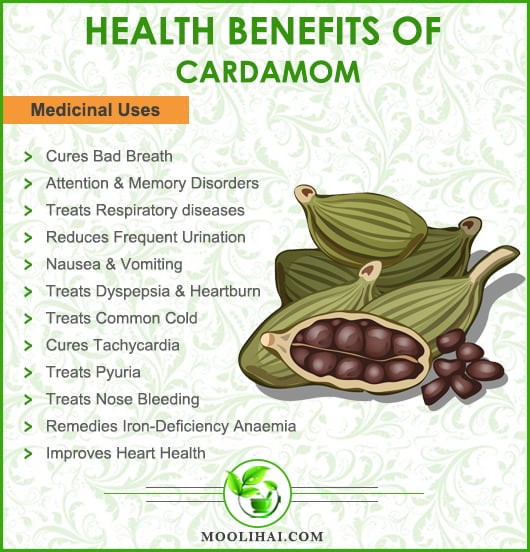
Contents
Benefits and Side Effects Of Cardamom
Cardamom is a spice in the ginger family. It has anti-inflammatory benefits and potential side effects including skin rashes, coughing, and other symptoms.
Cardamom is a spice in the ginger family. There are two varieties of cardamom pods: green and black. The green pods (Elettaria cardamomum) are known as cardamom. They are smaller and have a finer flavor than the black pods.
Cardamom is also referred to as:
- Cardamum
- Cardamon
- True cardamom
Cardamom is an important spice in South Asian and Middle Eastern cuisine. It is also used in European sweets such as Swedish cardamom buns and German cookies.
Health benefits of cardamom
Anti-Inflammatory Properties
Cardamom contains compounds with anti-inflammatory properties. Early studies suggest that cardamom may reduce levels of inflammatory markers.
Cardamom may also be beneficial for women with polycystic ovary syndrome (PCOS), as it can lower inflammation and androgen levels.
Digestive Aid
Cardamom may have a protective effect against Helicobacter pylori, a bacteria that causes stomach ulcers and gastritis.
Freshens Breath
Chewing on cardamom pods may help freshen breath by fighting common mouth bacteria.
Improves Fitness
The aroma of cardamom can stimulate the brain to release chemicals that increase energy levels and reduce fatigue.
A small study found that inhaling cardamom essential oil before exercise improved physical fitness compared to a control group.
Effects on Diabetes
Animal studies suggest that cardamom powder may improve glucose intolerance. However, human studies have yielded mixed results.
Potential Antibacterial Effects
Cardamom essential oils have shown effectiveness against bacteria that cause gastroenteritis. Further research is needed.
Side effects of cardamom
Cardamom is considered safe in typical amounts found in foods. Allergies to spices are rare but may include skin rashes, mouth itching, coughing, and very rarely, anaphylaxis.
Caution is recommended with doses exceeding 3 grams per day, as there is limited research on higher doses of cardamom.
One study found that consuming coffee with cardamom increased total cholesterol and LDL levels in participants. More research is needed to understand the effect of cardamom on cholesterol.
How to use cardamom
You can purchase cardamom whole, ground, or as essential oils.
Ground cardamom provides a fresher and fuller flavor than pre-ground cardamom. Grinding the spice as needed is recommended for optimal taste.
Cardamom should be stored in a cool, dry, and dark space. Whole spices can be used up to two years from the date of purchase, while ground spices should be used within one year.
When using cardamom pods, crush them before usage to release the flavor from the seeds inside.
Cardamom is a versatile spice that adds flavor to both savory and sweet dishes. It can be used in curries, desserts, breakfast cereals, and smoothies.
QUESTION
American Academy of Allergy Asthma & Immunology: "Can Spices Cause Allergic Reactions?"
Bioscience Discovery: "ANTIMICROBIAL AND SYNERGISTIC ACTIVITY OF INGREDIENTS OF BETEL QUID ON ORAL AND ENTERIC PATHOGENS."
British Journal of Sports Medicine: "Aromatherapy for sports and fitness."
CDC: “PCOS (Polycystic Ovary Syndrome) and Diabetes."
Eating and Weight Disorders: "Green cardamom plus low-calorie diet can decrease the expression of inflammatory genes among obese women with polycystic ovary syndrome: a double-blind randomized clinical trial."
Ethnobotanical Leaflets: "Antimicrobial Activity of Amomum subulatum and Elettaria cardamomum Against Dental Caries Causing Microorganisms."
Harvard Health Publishing: "Spice up your holidays with brain-healthy seasonings."
Institute of Culinary Education: "Five Guidelines for Sourcing and Storing Spices."
International Journal of Nutrition and Food Sciences: "Arabic coffee with two doses of cardamom."
Journal of Medicinal and Aromatic Crops: "Medicinal Properties of Cardamom Elettaria cardamomum."
Lipids in Health and Disease: "Cardamom powder supplementation prevents obesity, improves glucose intolerance, inflammation and oxidative stress in liver of high carbohydrate high fat diet induced obese rats."
Molecules: "Cardamom, Cumin, and Dill Weed Essential Oils: Chemical Compositions, Antimicrobial Activities, and Mechanisms of Action against Campylobacter spp."
National Institute of Dental and Craniofacial Research: "Tooth Decay."
Nitte University Journal of Health Science: "EVALUATION OF THE EFFICACY OF CARDAMOM AROMATHERAPY ON AEROBIC FITNESS & AUTONOMIC FUNCTIONS AMONG STUDENTS."
North Carolina Extension Gardener Plant Toolbox: "Elettaria cardamomum."
Nutrition Today: "Cardamom: Potential Health Benefits."
Phytotherapy Research: "In vitro susceptibility of Helicobacter pylori to botanical extracts used traditionally for the treatment of gastrointestinal disorders."
Oregon State University Extension Service: "Spices of India."
Oxidative Medicine and Cellular Longevity: "Role of Antioxidants and Natural Products in Inflammation."
The Review of Diabetic Studies: "Effects of Cinnamon, Cardamom, Saffron, and Ginger Consumption on Markers of Glycemic Control, Lipid Profile, Oxidative Stress, and Inflammation in Type 2 Diabetes Patients."


